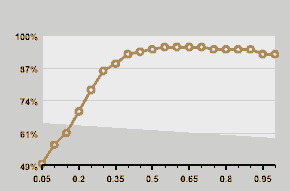I think I have the necessary monies for our retirement, but am holding a 50/50 Stock to Bond Asset Allocation on the advice of a Financial Adviser. Our source of present income is from a disability policy and meager income from the part time business.
I am 56 & wife is 51, we own and manage a part time professional small business, for our need of health Insurance and some professional/work satisfaction purposes.
We have been and are conservative Investors with mostly Vanguard Index Fund portfolio. If I calculate the 4% withdrawal rate expenses method we are covered well and if I calculate the present yearly expenses X 30 we come out good. As a back up we also own a investment real estate(Office Building) which would serve for 5 yrs of expenses
-I was at 45% stock/55% bond portfolio, following the age in Bonds rule of thumb.
-I changed it to the present 50%/50% on the advice of Vanguard's complimentary financial plan.
He was making a point about DW being (only) 51 and have potentially 40 to 45 yrs to live and we need to stay ahead of inflation etc.
Although the difference is not much between the above 2 asset allocations, I feel borderline uneasy when I think about the 2 or 3 Market Drops we have survived.
During the recent market drop I worried about the declining personal wealth but did wait for the market turn around without any selling.
I am also reading articles about walking away from the investing table when one's game is done (Accumulated enough for retirement) and minimize any more risk to the present sum of monies.
I think mentally I would feel comfortable with 30% stocks portfolio, although I realize the 70% Bonds may not be as safe I think they are, as the interest rates may not stay this low for long.
Although I know one has to go with their own comfort level individually, I am curious to know any opinions and insights of others if they would face such a situation. What would be your asset allocation ??
Thanks in advance for any and all opinions.
I am 56 & wife is 51, we own and manage a part time professional small business, for our need of health Insurance and some professional/work satisfaction purposes.
We have been and are conservative Investors with mostly Vanguard Index Fund portfolio. If I calculate the 4% withdrawal rate expenses method we are covered well and if I calculate the present yearly expenses X 30 we come out good. As a back up we also own a investment real estate(Office Building) which would serve for 5 yrs of expenses
-I was at 45% stock/55% bond portfolio, following the age in Bonds rule of thumb.
-I changed it to the present 50%/50% on the advice of Vanguard's complimentary financial plan.
He was making a point about DW being (only) 51 and have potentially 40 to 45 yrs to live and we need to stay ahead of inflation etc.
Although the difference is not much between the above 2 asset allocations, I feel borderline uneasy when I think about the 2 or 3 Market Drops we have survived.
During the recent market drop I worried about the declining personal wealth but did wait for the market turn around without any selling.
I am also reading articles about walking away from the investing table when one's game is done (Accumulated enough for retirement) and minimize any more risk to the present sum of monies.
I think mentally I would feel comfortable with 30% stocks portfolio, although I realize the 70% Bonds may not be as safe I think they are, as the interest rates may not stay this low for long.
Although I know one has to go with their own comfort level individually, I am curious to know any opinions and insights of others if they would face such a situation. What would be your asset allocation ??
Thanks in advance for any and all opinions.

